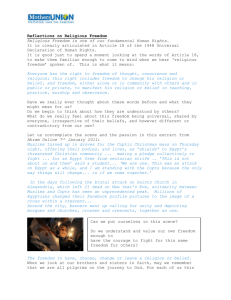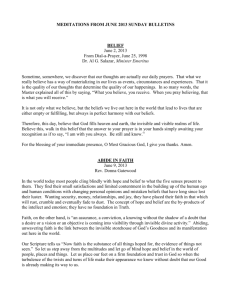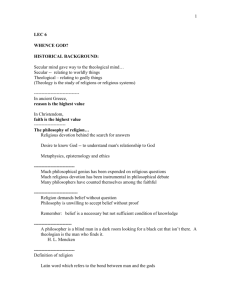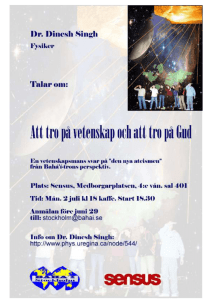What is This I Believe? www.thisibelieve.org This I Believe Essay
advertisement
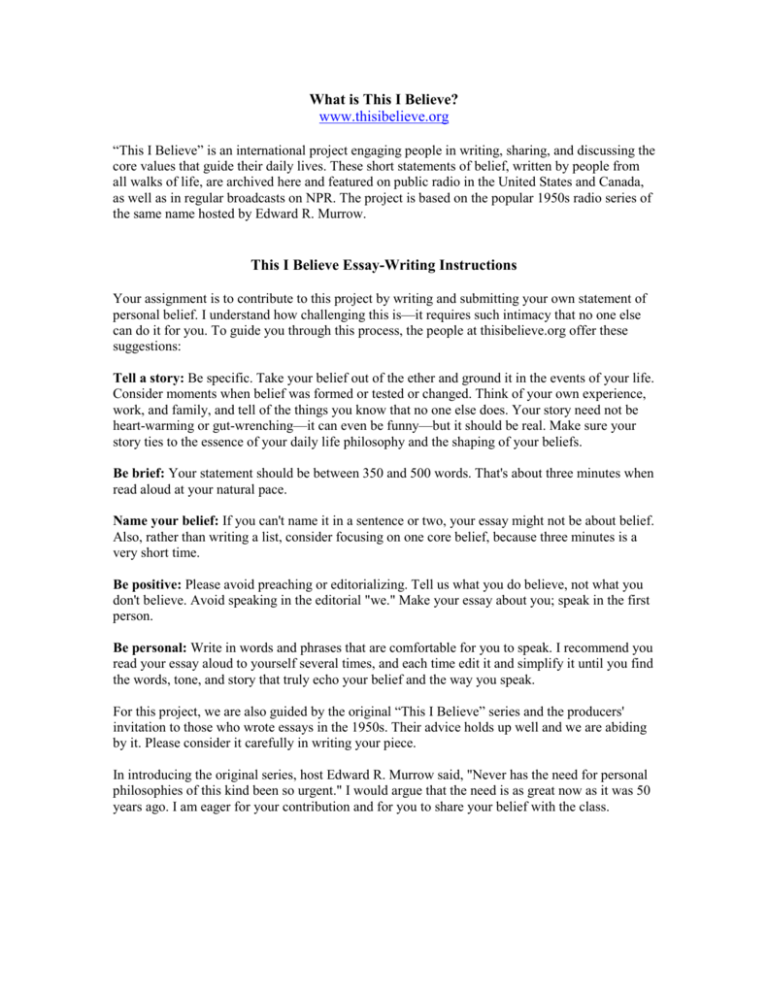
What is This I Believe? www.thisibelieve.org “This I Believe” is an international project engaging people in writing, sharing, and discussing the core values that guide their daily lives. These short statements of belief, written by people from all walks of life, are archived here and featured on public radio in the United States and Canada, as well as in regular broadcasts on NPR. The project is based on the popular 1950s radio series of the same name hosted by Edward R. Murrow. This I Believe Essay-Writing Instructions Your assignment is to contribute to this project by writing and submitting your own statement of personal belief. I understand how challenging this is—it requires such intimacy that no one else can do it for you. To guide you through this process, the people at thisibelieve.org offer these suggestions: Tell a story: Be specific. Take your belief out of the ether and ground it in the events of your life. Consider moments when belief was formed or tested or changed. Think of your own experience, work, and family, and tell of the things you know that no one else does. Your story need not be heart-warming or gut-wrenching—it can even be funny—but it should be real. Make sure your story ties to the essence of your daily life philosophy and the shaping of your beliefs. Be brief: Your statement should be between 350 and 500 words. That's about three minutes when read aloud at your natural pace. Name your belief: If you can't name it in a sentence or two, your essay might not be about belief. Also, rather than writing a list, consider focusing on one core belief, because three minutes is a very short time. Be positive: Please avoid preaching or editorializing. Tell us what you do believe, not what you don't believe. Avoid speaking in the editorial "we." Make your essay about you; speak in the first person. Be personal: Write in words and phrases that are comfortable for you to speak. I recommend you read your essay aloud to yourself several times, and each time edit it and simplify it until you find the words, tone, and story that truly echo your belief and the way you speak. For this project, we are also guided by the original “This I Believe” series and the producers' invitation to those who wrote essays in the 1950s. Their advice holds up well and we are abiding by it. Please consider it carefully in writing your piece. In introducing the original series, host Edward R. Murrow said, "Never has the need for personal philosophies of this kind been so urgent." I would argue that the need is as great now as it was 50 years ago. I am eager for your contribution and for you to share your belief with the class. How Is It Possible to Believe in God? As heard on NPR's Morning Edition, May 23, 2005. I've always liked the exchange featuring the excited young Darwinian at the end of the 19th century. He said grandly to the elderly scholar, "How is it possible to believe in God?" The imperishable answer was, "I find it easier to believe in God than to believe that Hamlet was deduced from the molecular structure of a mutton chop." That rhetorical bullet has everything -- wit and profundity. It has more than once reminded me that skepticism about life and nature is most often expressed by those who take it for granted that belief is an indulgence of the superstitious -- indeed their opiate, to quote a historical cosmologist most profoundly dead. Granted, that to look up at the stars comes close to compelling disbelief -- how can such a chance arrangement be other than an elaboration -- near infinite -- of natural impulses? Yes, on the other hand, who is to say that the arrangement of the stars is more easily traceable to nature, than to nature's molder? What is the greater miracle: the raising of the dead man in Lazarus, or the mere existence of the man who died and of the witnesses who swore to his revival? The skeptics get away with fixing the odds against the believer, mostly by pointing to phenomena which are only explainable -- you see? -- by the belief that there was a cause for them, always deducible. But how can one deduce the cause of Hamlet? Or of St. Matthew's Passion? What is the cause of inspiration? This I believe: that it is intellectually easier to credit a divine intelligence than to submit dumbly to felicitous congeries about nature. As a child, I was struck by the short story. It told of a man at a bar who boasted of his rootlessness, derisively dismissing the jingoistic patrons to his left and to his right. But later in the evening, one man speaks an animadversion on a little principality in the Balkans and is met with the clenched fist of the man without a country, who would not endure this insult to the place where he was born. So I believe that it is as likely that there should be a man without a country, as a world without a creator. William F. Buckley, Jr. founded National Review magazine in 1955 and was its editor for many years. As a conservative commentator, he was the host of the long-running public television program “Firing Line.” Buckley is also the author of the acclaimed series of Blackford Oakes spy novels. An Ideal of Service to Our Fellow Man The most beautiful thing we can experience is the mysterious—the knowledge of the existence of something unfathomable to us, the manifestation of the most profound reason coupled with the most brilliant beauty. I cannot imagine a god who rewards and punishes the objects of his creation, or who has a will of the kind we experience in ourselves. I am satisfied with the mystery of life’s eternity and with the awareness of—and glimpse into—the marvelous construction of the existing world together with the steadfast determination to comprehend a portion, be it ever so tiny, of the reason that manifests itself in nature. This is the basis of cosmic religiosity, and it appears to me that the most important function of art and science is to awaken this feeling among the receptive and keep it alive. I sense that it is not the State that has intrinsic value in the machinery of humankind, but rather the creative, feeling individual, the personality alone that creates the noble and sublime. Man’s ethical behavior should be effectively grounded on compassion, nurture, and social bonds. What is moral is not of the divine, but rather a purely human matter, albeit the most important of all human matters. In the course of history, the ideals pertaining to human beings’ behavior toward each other and pertaining to the preferred organization of their communities have been espoused and taught by enlightened individuals. These ideals and convictions—results of historical experience, empathy, and the need for beauty and harmony—have usually been willingly recognized by human beings, at least in theory. The highest principles for our aspirations and judgments are given to us westerners in the JewishChristian religious tradition. It is a very high goal: free and responsible development of the individual, so that he may place his powers freely and gladly in the service of all mankind. The pursuit of recognition for its own sake, an almost fanatical love of justice, and the quest for personal independence form the traditional themes of the Jewish people, of which I am a member. But if one holds these high principles clearly before one’s eyes and compares them with the life and spirit of our times, then it is glaringly apparent that mankind finds itself at present in grave danger. I see the nature of the current crises in the juxtaposition of the individual to society. The individual feels more than ever dependent on society, but he feels this dependence not in the positive sense, cradled, connected as part of an organic whole; he sees it as a threat to his natural rights and even his economic existence. His position in society, then, is such that that which drives his ego is encouraged and developed, and that which would drive him toward other men— a weak impulse to begin with—is left to atrophy. It is my belief that there is only one way to eliminate these evils, namely, the establishment of a planned economy coupled with an education geared toward social goals. Alongside the development of individual abilities, the education of the individual aspires to revive an ideal that is geared toward the service of our fellow man, and that needs to take the place of the glorification of power and outer success. Albert Einstein published his general theory of relativity in 1916, profoundly affecting the study of physics and cosmology for years. He won the Nobel Prize for Physics in 1921 for his work on the photo-electric effect. Einstein taught for many years at the Institute for Advanced Study at Princeton. An Athlete of God I believe that we learn by practice. Whether it means to learn to dance by practicing dancing, or to learn to live by practicing living, the principles are the same. In each, it is the performance of a dedicated, precise set of acts, physical or intellectual, from which come shape of achievement, the sense of one’s being, the satisfaction of spirit. One becomes in some area an athlete of God. Practice means to perform over and over again, in the face of all obstacles, some act of vision, of faith, of desire. Practice is a means of inviting the perfection desired. I think the reason dance has held such an ageless magic for the world is that it has been the symbol of the performance of living. Many times, I here the phrase, “the dance of life.” It is close to me for a very simple and understandable reason. The instrument through which the dance speaks is also the instrument through which life is lived: the human body. It is the instrument by which all the primaries of experience are made manifest. It holds in its memory all matters of life and death and love. Dancing appears glamorous, easy, delightful. But the path to the paradise of that achievement is not easier than any other. There is fatigue so great that the body cries even in its sleep. There are times of complete frustration. There are daily small deaths. Then, I need all the comfort that practice has stored in my memory and the tenacity of faith. But it must be the kind of faith that Abraham had, wherein he “staggered not at the promise of God through unbelief.” It takes about 10 years to make a mature dancer. The training is twofold. There is the study and practice of the craft in order to strengthen the muscular structure of the body. The body is shaped, disciplined, honored, and in time, trusted. The movement becomes clean, precise, eloquent, truthful. Movement never lies. It is a barometer telling the state of the soul’s weather to all who can read it. This might be called the law of the dancer’s life, the law which governs its outer aspects. Then, there is the cultivation of the being. It is through this that the legends of the soul’s journey are retold with all their gaiety and their tragedy and the bitterness and sweetness of living. It is at this point that the sweep of life catches up the mere personality of the performer, and while the individual—the undivided one—becomes greater, the personal becomes less personal. And there is grace. I mean the grace resulting from faith…faith in life, in love, in people, in the act of dancing. All this is necessary to any performance in life which is magnetic, powerful, rich in meaning. In a dancer there is a reverence for such forgotten things as the miracle of the small beautiful bones and their delicate strength. In a thinker there is a reverence for the beauty of the alert and directed and lucid mind. In all of us who perform, there is an awareness of the smile, which is part of the equipment, or gift, of the acrobat. We have all walked the high wire of circumstance at times. We recognize the gravity of pull of the Earth as he does. The smile is there because he is practicing living at that instant of danger. He does not choose to fall. In seven decades as a dancer and choreographer, Martha Graham created 181 ballets. A founder of modern dance, she is know for her collaborations with other leading artists, including composer Aaron Copland. Graham's company trained dance greats such as Alvin Ailey and Twyla Tharp. The Virtues of the Quiet Hero As heard on NPR's All Things Considered, October 17, 2005. I believe in honor, faith, and service--to one's country and to mankind. It's a lesson I learned from my family, from the men with whom I served in Vietnam and from my fellow Americans. Take William B. Ravnel. He was in Patton's tank corps that went across Europe. I knew him, though, as an English teacher and football coach in my school. He could make Shakespeare come alive and he had incredible leadership talents that made me idolize him. What he taught me more than anything else was to strictly adhere to our school's honor code. If we stuck to those standards of integrity and honor then we could be proud of ourselves. We could serve causes greater than our own self-interest. Years later, I saw an example of honor in the most surprising of places. As a scared American prisoner of war in Vietnam, I was tied in torture ropes by my tormentors and left alone in an empty room to suffer through the night. Later in the evening, a guard I had never spoken to entered the room and silently loosened the ropes to relieve my suffering. Just before morning, that same guard came back and re-tightened the ropes before his less humanitarian comrades returned. He never said a word to me. Some months later on a Christmas morning, as I stood alone in the prison courtyard, that same guard walked up to me and stood next to me for a few moments. Then with his sandal, the guard drew a cross in the dirt. We stood wordlessly there for a minute or two, venerating the cross, until the guard rubbed it out and walked away. To me, that was faith: a faith that unites and never divides, a faith that bridges unbridgeable gaps in humanity. It is the faith that we are all equal and endowed by our Creator with inalienable rights to life, liberty and the pursuit of happiness. It is the faith I would die to defend. My determination to act with honor and integrity impels me to work in service to my country. I have believed that the means to real happiness and the true worth of a person is measured by how faithfully we serve a cause greater than our self-interest. In America, we celebrate the virtues of the quiet hero--the modest man who does his duty without complaint or expectation of praise; the man who listens closely for the call of his country, and when she calls, he answers without reservation, not for fame or reward, but for love. I have been an imperfect servant of my country and my mistakes rightly humble me. I have tried to live by these principles of honor, faith and service because I want my children to live by them as well. I hope to be a good example to them so that when their generation takes our place, they will make better decisions and continue to pave the path towards righteousness and freedom. John McCain is the son and grandson of Navy admirals. After graduating from Annapolis as a naval aviator, McCain was shot down over North Vietnam and spent five years as a prisoner of war. He has been a U.S. Senator from Arizona since 1986 and ran for President in 2000 and 2008. There is No God I believe that there is no God. I'm beyond atheism. Atheism is not believing in God. Not believing in God is easy -- you can't prove a negative, so there's no work to do. You can't prove that there isn't an elephant inside the trunk of my car. You sure? How about now? Maybe he was just hiding before. Check again. Did I mention that my personal heartfelt definition of the word "elephant" includes mystery, order, goodness, love and a spare tire? So, anyone with a love for truth outside of herself has to start with no belief in God and then look for evidence of God. She needs to search for some objective evidence of a supernatural power. All the people I write e-mails to often are still stuck at this searching stage. The atheism part is easy. But, this "This I Believe" thing seems to demand something more personal, some leap of faith that helps one see life's big picture, some rules to live by. So, I'm saying, "This I believe: I believe there is no God." Having taken that step, it informs every moment of my life. I'm not greedy. I have love, blue skies, rainbows and Hallmark cards, and that has to be enough. It has to be enough, but it's everything in the world and everything in the world is plenty for me. It seems just rude to beg the invisible for more. Just the love of my family that raised me and the family I'm raising now is enough that I don't need heaven. I won the huge genetic lottery and I get joy every day. Believing there's no God means I can't really be forgiven except by kindness and faulty memories. That's good; it makes me want to be more thoughtful. I have to try to treat people right the first time around. Believing there's no God stops me from being solipsistic. I can read ideas from all different people from all different cultures. Without God, we can agree on reality, and I can keep learning where I'm wrong. We can all keep adjusting, so we can really communicate. I don't travel in circles where people say, "I have faith, I believe this in my heart and nothing you can say or do can shake my faith." That's just a long-winded religious way to say, "shut up," or another two words that the FCC likes less. But all obscenity is less insulting than, "How I was brought up and my imaginary friend means more to me than anything you can ever say or do." So, believing there is no God lets me be proven wrong and that's always fun. It means I'm learning something. Believing there is no God means the suffering I've seen in my family, and indeed all the suffering in the world, isn't caused by an omniscient, omnipresent, omnipotent force that isn't bothered to help or is just testing us, but rather something we all may be able to help others with in the future. No God means the possibility of less suffering in the future. Believing there is no God gives me more room for belief in family, people, love, truth, beauty, sex, Jell-O and all the other things I can prove and that make this life the best life I will ever have. Penn Jillette is the taller, louder half of the magic and comedy act Penn and Teller. He is a research fellow at the Cato Institute and has lectured at Oxford and MIT. Penn has co-authored three best-selling books and is executive producer of the documentary film, “The Aristocrats.”

